#Best Website Builder for Shopify
Text
How To Choose The Best Shopify Development Company
To select the best Shopify development company, consider these key factors:
Experience: Choose a company with a proven track record in Shopify development and a portfolio of successful projects.
Expertise: Ensure the company specializes in e-commerce and understands your industry.
Customization: Look for developers who can tailor your Shopify store to meet your unique needs.
Reviews and References: Check client reviews and request references to assess the company's reputation.
Communication: Opt for a team that communicates effectively and keeps you informed throughout the project.
Pricing: Compare quotes and ensure they align with your budget.
Support: Select a company that offers post-launch support and maintenance.
Compliance: Ensure the company follows Shopify's guidelines and best practices.
Scalability: Plan for future growth by choosing a company that can scale your store.
Deadline: Set clear timelines and ensure the company can meet your project's deadlines.
#Shopify Website Development Services#Shopify Store Development Services#Best Shopify Developer#Shopify Web Development Services#Hire Shopify Agency#Best Website Builder for Shopify#Hire Shopify Developers India#Shopify Developers#Hire Shopify Expert#Shopify Hire an Expert#Shopify Developer Freelance#Shopify Website Developers#Hire Dedicated Shopify Developer#Hire Developers#Shopify Website Builders#Shopify Website Build#Shopify Experts#Shopify custom development in Silicon Valley#Shopify experts South Africa#Shopify development cost#hire Shopify developer Dallas tx
2 notes
·
View notes
Text
Crafting Your Online Identity: The Top Website Builders for Small Enterprises
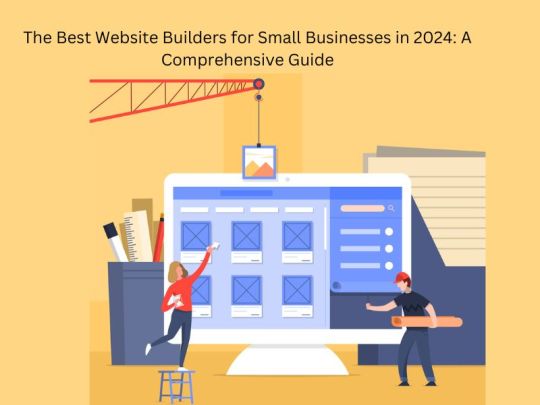
Having a strong online presence is essential for small businesses to thrive. With numerous website builders available, it can be challenging to choose the right one that suits your specific needs. To help you navigate through the options, we've curated a list of the five best website builders for small businesses in 2024, with WordPress.com taking the top spot.
1. WordPress.com: Best Website Builder for Content-Focused Companies
WordPress.com stands out as the top choice for small businesses looking to create content-focused websites. With its user-friendly interface and extensive library of customizable themes, WordPress.com offers unparalleled flexibility and control over your website's design. Whether you're a beginner or an experienced user, WordPress.com caters to all skill levels.
Key Features:
- Optimized for SEO: WordPress.com comes with built-in SEO features, making it easier for your website to rank higher in search engine results pages (SERPs).
- Customization Options: Choose from over 11,000 mobile-responsive themes and customize them to match your brand's identity.
- Knowledge Base: Access WordPress.com's extensive knowledge base, including tutorials, videos, and a community forum, to guide you through the WordPress Development and website-building process..
- Pricing and Plans: WordPress.com offers a range of pricing plans to suit different budgets, starting from a free plan with limited features to premium plans with advanced functionalities.
Pros:
- Simple setup process with thousands of customizable templates
- SEO-friendly features to improve your site's visibility
- Unlimited storage and bandwidth on premium plans
- Affordable pricing options for small businesses
Cons:
- Steeper learning curve compared to other website builders
- Limited customization options on certain themes
2. Wix: Best Website Builder Overall
Wix is renowned for its simplicity and versatility, making it an ideal choice for small businesses across various industries. With its drag-and-drop editor and AI-powered design tools, Wix empowers users to create professional-looking websites with ease.
Key Features:
- Purpose-Built Templates: Choose from a wide range of templates tailored to different industries and goals, including blogs, e-commerce stores, portfolios, and more.
- SEO Tools: Wix offers numerous SEO features out of the box, helping small business owners optimize their websites for better search engine visibility.
- AI-Managed Social Media Ads: Subscribe to Facebook Ads by Wix to create, launch, and track Facebook and Instagram ads directly from your Wix dashboard.
- Email Marketing Campaigns: Utilize Wix's email tools to drive more visitors to your site and automate your email marketing campaigns.
Pros:
- Intuitive drag-and-drop editor for easy website customization
- Advanced marketing tools for SEO, social media ads, and email marketing
- Affordable pricing plans with a free option available
Cons:
- Limited design flexibility compared to other website builders
- Automatically generated mobile version may require manual adjustments
3. Squarespace: Best Website Builder for Creatives and Small Online Sellers
Squarespace stands out for its visually stunning templates and robust e-commerce features, making it an excellent choice for creatives and small online sellers. With its emphasis on design and user experience, Squarespace enables businesses to showcase their products and services effectively.
Key Features:
- High-Quality Templates: Choose from professionally designed templates optimized for image-heavy websites, blogs, and e-commerce stores.
- SEO Optimization: Squarespace offers built-in SEO features, including mobile-responsive designs, auto-generated sitemaps, and clean URLs.
- Social Media Marketing: Integrate your social media accounts with Squarespace to promote your products and engage with your audience effectively.
- Email Marketing Campaigns: Create and automate email marketing campaigns using Squarespace's customizable email templates and tracking tools.
Pros:
- Focus on branding and design with award-winning templates
- Unlimited storage and bandwidth on all plans
- Seamless integration with social media platforms
Cons:
- Less design flexibility compared to other website builders
- Editor may not be as intuitive for beginners
4. Shopify: Best for E-commerce
Shopify is the go-to choice for small businesses looking to establish or expand their online stores. With its comprehensive e-commerce features and user-friendly interface, Shopify empowers entrepreneurs to sell products seamlessly across multiple channels.
Key Features:
- E-commerce Integration: Create and manage your online store with ease, including real-time inventory updates, order management, and shipping options.
- SEO Tools: Shopify offers essential SEO features, such as responsive themes, auto-generated sitemaps, and meta tag optimization, to improve your store's visibility.
- Social Media Marketing: Connect your Shopify store with social media platforms to create shoppable posts and manage social orders directly from your dashboard.
- Email Marketing: Utilize Shopify's email marketing tools to create and automate email campaigns, driving more traffic to your store and increasing sales.
Pros:
- Easy setup process with no coding required
- Advanced marketing and analytics tools for e-commerce businesses
- Seamless integration with third-party apps and payment gateways
Cons:
- Limited customization options compared to other website builders
- Transaction fees when using third-party payment providers
5. Webflow: Best No-Code Website Builder for Customization
Webflow stands out for its advanced customization features and powerful CMS, making it an ideal choice for businesses seeking complete control over their website's design and functionality. With its intuitive interface and extensive range of design elements, Webflow empowers users to create professional-grade websites without writing a single line of code.
Key Features:
- Customization Options: Design your website with precision using Webflow's drag-and-drop editor and advanced styling features, including parallax scrolling, multi-step animations, and micro interactions.
- SEO Optimization: Webflow offers robust SEO tools, such as responsive design, auto-generated sitemaps, and meta tag optimization, to improve your site's search engine visibility.
- Knowledge Base: Access Webflow's extensive knowledge base, including tutorials, videos, and a community forum, to learn how to leverage the platform's features effectively.
- Pricing and Plans: Webflow offers a range of pricing tiers for general and e-commerce websites, with options starting from a free plan to premium plans with advanced functionalities.
Pros:
- Freedom to customize your site without coding knowledge
- Extensive range of templates and design elements to suit your needs
- Excellent knowledge base with comprehensive tutorials and support resources
Cons:
- Steeper learning curve compared to other website builders
- Limited integrations and marketing options
Conclusion:
Choosing the right website builder is crucial for small businesses looking to establish a strong online presence. Whether you prioritize ease of use, design flexibility, or e-commerce capabilities, the options listed above offer something for every business need. Consider your specific requirements and budget constraints to select the website builder that best aligns with your goals. With the right tools and strategies in place, you can create a professional-grade website that helps your business thrive in the digital landscape of 2024.
0 notes
Text
Tips for making your Shopify store a success
Tips for making your Shopify store a success
A mobile-friendly Shopify store also helps all around with things like content marketing and SEO, so it should be one of your first priorities before the launch.
Compress Your Images to Reduce Loading Times
Run Each New Page through Google's Mobile-Friendly Test
Minimize Unnecessary Plugins on Your Site
Use an Upsell App to Increase Your Shopify Success Rate
Upsell apps like reconvert can help to increase average order value with a minimal upfront investment, ultimately leading to even higher ROI.
Using suggestive selling tactics in your own store is one of the best ways to increase your average order value from every transaction.
Invest Resources in Marketing Channels with High ROI
Online advertising is great, but sometimes brands find the most success with less competitive channels. Consider diverting a portion of your marketing resources towards less competitive channels:
SEO and Content Marketing
Affiliate & Referral Marketing
Form Strategic Brand Partnerships
Create and Utilize Your Email List to Its Full Extent
Email marketing forms the backbone of many huge brands' marketing operations, and for good reason.
It's one of the best ways you can recapture abandoned carts, stay at the top of consumer minds, and provide valuable content that converts casual customers into loyal followers.
Ensure Your Shipping is Fast & Reliable
In the age of Amazon shopping, ecommerce customers expect lightning-fast shipping.
If your store doesn't provide fast shipping, or even worse, products arrive damaged. You'll likely see a flood of bad reviews, returned products, and lost customers.
To avoid that, make sure that your products are shipped and delivered promptly.
Prioritize Stellar Customer Service for a Higher Shopify Success Rate
Bad customer service can mean a lost customer and a negative review for your business. On the other hand, great customer service can be the start of a customer's journey towards being a loyal brand follower.
Here are a few tips you can use to improve your store's customer service:
Reduce Waiting Times
Use a Live Chat App
Take Customer Feedback Seriously
Focus on High-Ticket Products with High Markups
A low product markup means you'll have to use the minimum amount of resources possible to earn each purchase and stay profitable. This can be especially tricky in the beginning when you're trying to build awareness of your brand and get customers to purchase.
A markup of at least 200% means that you won't be cutting it too close for most products, and you'll have ample resources to make a significant profit on every purchase.
For More information visit our website :- https://jgservices.in/
#marketing#shopify expert account#shopify expert agency#shopify expert dubai#shopify expert fiverr#shopify expert for hire#shopify expert freelancer#shopify expert hire#shopify expert in upwork#shopify expert india freelancer#shopify expert linkedin#shopify expert marketplace#shopify expert near me#shopify expert on instagram#shopify expert upwork#shopify expert website builder#best amazon account management services#best amazon account management services india#best crm for account management#best forex account management services#digital account management#e commerce#e commerce business#e commerce solution#e commerce company#e commerce shopify#online commerce#e commerce marketing#e business#shopify business
1 note
·
View note
Text
Choosing the Right CMS for Your Website: Factors to Consider and Key Features to Look for
Choosing the right CMS for your website is a very important task before starting a website. Before opting for Drupal development services or services that involve any other CMS, you should ensure that you’re making the right choice. Selecting the wrong content management system is a common mistake website owners do (also, a quite expensive one, by the way). So if you don’t want to migrate your…

View On WordPress
#Can a website have multiple CMS?#Do all websites need a CMS?#Do I need CMS for SEO?#Do you need coding for CMS?#Does CMS affect SEO?#Does YouTube use CMS?#How do I choose a CMS for my website?#How do you evaluate CMS?#How many sites use CMS?#How to design a CMS system?#How would you choose the best fit CMS for an organization?#Is Google Sites a CMS?#Is Shopify a CMS system?#Is WordPress a CMS or website builder?#Is WordPress a CMS?#Is WordPress the best CMS for SEO?#What are the 3 different types of CMS?#What are two 2 benefits of using CMS?#What are two disadvantages to using the CMS?#What CMS do most companies use?#What CMS do web developers use?#What CMS is used by Google?#What features should a CMS have?#What is a CMS for your website?#What is an example of a CMS website?#What is CMS in WordPress?#What is number 1 CMS?#What is the best CMS for beginners?#What is the difference between CMS and website?#What is the fastest CMS?
0 notes
Text
Why should business people opt to rely on Shopify e-commerce solutions?
It’s a dream to have your own online business. But are you a bit flustered about how to create a mass presence in this comparative web world? Surprisingly with the help of tools, apps and expert guidance, you can create one without any hassle. But the question here is who can give that leverage and wide popularity. Speaking of which, Shopify e-commerce solutions come to the forefront. Of course, you will discover a few significant pointers that vehemently support why you should opt for Shopify.

All in one Hub
Shopify is a powerful eCommerce solution enabling business owners to create online stores. Indeed they can sell their products and services with complete ease. It is an all-in-one platform that provides everything a business needs to create a successful online store. Here you can get all sorts of features right, From designing and developing the store to managing inventory, processing payments, and shipping products. Thus having Shopify keeps you in the front seat always.

Designed for the business of all sizes and genres
With Shopify, you can excel in your business quickly. It is because Shopify offers coverage for all sorts of industry and niches. From large setups to start-ups, all can have Shopify as their selling platform. Even different packages are there to create online stores that too in a personalised way. Of course, it is designed to meet all sorts of typical requirements of the clients.

The Interface is easy to use
Those planning to use Shopify for the first time have this apprehension that it might demand a bit of technical or programming language. However, that is not the case with Shopify at all. Shopify uses an interface that is designed for all kinds of users. It comes with inbuilt themes and templates, allowing you to customise the look of your online shop.
Easy management of inventory
Once you are done with the shopify store setup, the next thing that might bother you is managing the online store. Well, with Shopify, that again becomes an easy chore; you can easily stock, enlist and display products.
Final Thought
Thus, With Shopify Ecommerce Developer, you can relax but simultaneously have your own business. So please don’t waste time and go for it.
#shopify store setup#Shopify as their selling platform#Shopify e-commerce solutions#Web Design Gold Coast#Shopify Ecommerce Developer#shopify Online Store Builder#Shopify is an eCommerce platform#Best eCommerce Platform#building an eCommerce website#With Shopify Ecommerce Developer#Custom Shopify Website Design#Custom eCommerce strategy#Shopify ecommerce website builder#shopify ecommerce Services#Shopify support plans#Shopify ecommerce agency#Shopify support retainer#Leverage our eCommerce expertise#increase sales
0 notes
Text

Welcome to my gig, are you require a professional expert social media creator?
At present, finding a unique professional expert social media creator is a challenge, Don't worry you're not alone, you are now in the right place.
I am a professional, passionate, creative, & dynamic online social media creator /builder like Facebook, Instagram, Twitter, & Linkedin.
Let me help you, I’m capable of working best for your business expansion according to your demand. (create, setup, and optimize social media business accounts & Pages)
The services I provide you:
Social media accounts create setup & optimize
Username setup
Banner/Cover Design
business location setup
Add CTA Button
Highlight Icons (Only For Instagram)
Website Integration (Shopify/WordPress/Wix)
NOTE: LinkedIn profile will not create
#design#digitalmarketing#fiverr#social#social media marketing#love#beauty#creative logo#socialmediastrategy#artists on tumblr
3 notes
·
View notes
Text
The Best B2B Ecommerce Platform for 2023
There are a lot of factors that overlap between B2C and B2b selling.
whether you're selling to a company or an end-customer, you're going to need a strategy for building relationships with your target audience. This means investing in tools like landing page builders, email marketing that you can automate, and even social media integrations.
To save yo some cruicial time and effort in the hunt for the right ecommerce capabilities, we've put together this list of our top B2b ecommerce website builders and tools.
Shopify Plus: It is a cloud-based, fully hosted e-commerce platform that provides businesses with an all-in-one solution to sell their products online. It has robust B2B features like custom pricing, wholesale channel, and purchase orders.
Magento Commerce: It is an open-source e-commerce platform that provides businesses with a flexible and customizable solution for their B2B needs. It has features like customer segmentation, account management, and custom pricing.
BigCommerce: It is a cloud-based e-commerce platform that provides businesses with a feature-rich solution for their B2B needs. It has features like customer groups, custom pricing, and purchase orders.
WooCommerce: It is an open-source e-commerce platform that provides businesses with a scalable and customizable solution for their B2B needs. It has features like customer management, product catalog management, and order management.
Dial42: Dial42 provide a convenient way for businesses to source products and services, compare prices, and negotiate with suppliers without having to go through traditional procurement channels. Dial42 also offer various value-added services such as logistics, payment processing, and dispute resolution to streamline the buying and selling process for businesses.
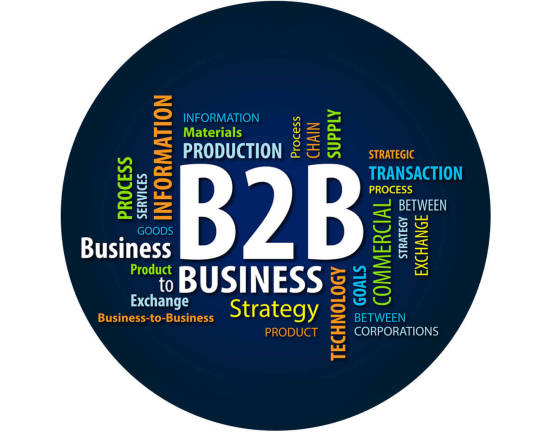
#B2B#B2C#B2BMarketing#B2BSales#B2BLeadGeneration#B2BBusiness#B2BMarketplace#ecommerce#Marketplace#Sales#BusinessListing#BusinessDirectory#FreeWebStore#ConnectSellGrow#marketing
3 notes
·
View notes
Text
Best Methods to Sell Print on Demand Gadgets Online (Part 1)
Do you adore Apple products? Perhaps you have a strong interest in the most recent laptops or a thorough understanding of cutting-edge smartphones. Whatever the reason, now could be an excellent time to launch an online gadgets store, especially given that the consumer gadgets industry in the United States alone is expected to be worth $2.06 trillion by 2023. However, selling online isn't always easy – and you might find yourself at a loss for where to begin. But don't worry; this ultimate guide to selling print on demand gadgets online will assist you. Continue reading to learn more.
How to Sell Print on Demand Gadgets Online?
1. Source Your Gadgets
You'll need to source gadgets before you can start selling them online. There are several options to consider for this and suitability for your specific goals and situation.
Wholesale
When looking for products for your business, the first place you'll probably look is a gadgets wholesaler – this is how most online and local gadgets stores get their products. On new gadgets, wholesalers will usually offer relatively competitive prices. They're also likely to have a good stock level, allowing you to get the products you need when you need them. Some wholesalers may have minimum order requirements, so consider where you'll store your gadgets before selling them.
Print on Demand Fulfillment
If you don't want to waste time sourcing and storing products, print on demand fulfillment can be a great option. When using print on demand services, your primary goal is to market and sell as many products as possible. When an order is received, it is routed to the company that fulfills it. It reduces storage and eliminates the need to deal with shipping and distribution companies' often complex arrangements. Of course, less effort equals less profit. It can be much more difficult to make a reasonable profit on each product you sell when hiring a print on demand company. That is why it is best to concentrate on volume.
Second Hand
Selling used gadgets can be a lucrative business venture. However, it can take significantly longer than purchasing from a wholesaler or print on demand fulfillment products. You're also dealing with uncertainty about future stock levels, which could make meeting customer demand difficult. However, if you can pull it off, sourcing and selling used gadgets can be very profitable and environmentally friendly. You can find used gadgets almost anywhere, from yard sales, eBay, Facebook Marketplace, and Amazon.
2. Sell Your Gadgets Online
Touch the surface of the online gadgets business, and you'll discover a plethora of options for where to sell.
Personal Website
Creating your own online store is arguably the best way to sell gadgets online. When you do this, you create a true asset – not to mention one over which you have complete control. Using a market-leading website builder, such as Wix or Shopify, will provide you with all of the tools you need to create a website that you can use to grow your business quickly and easily. Although all online selling platforms have advantages, owning your own site gives you the most room to grow.
Marketplaces
You can sell gadgets on several online marketplaces. The most popular are Amazon and Walmart. Using an online marketplace has several advantages, including ease with payments. However, there are some disadvantages to using an online marketplace. Unlike your website, you do not own the platform, which means you have little control over any changes to it, such as changes in functionality or commission increases.
Social Media
Many major social media platforms, including Facebook, Instagram, and Pinterest, now allow you to sell directly to your customers, eliminating the need to link to an external site. It is a great way to tap into your audience's engagement with social media platforms while also leveraging the following and hype you've built on your own social channels. However, there are some drawbacks to using online marketplaces, such as having little control over the platform and how your business operates on it. Most businesses that sell on social media pair it with their online store to expand their reach and make it easier for their customers to buy from them.
Trade-in
A trade-in site is a final option for selling gadgets online. Unlike online stores, marketplaces, or social media, these sites guarantee to buy your products and price them based on the model, age, and condition. You'll usually get a much lower price for your products if you sell them on these sites. They do, however, save you a significant amount of money on sales, marketing, and store setup. These sites can be profitable if you can find cheap second-hand gadgets or shift stock from your online store that isn't selling.
Check out Part 2 on the next page!
If you’re interested in outsourcing print on demand gadgets to sell online, you can check us out and get a quote.
#print on demand gadgets#print on demand#print on demand fulfillment#print on demand services#print on demand company#fulfillplex
2 notes
·
View notes
Text
Shopify Vs WordPress Both platforms are excellent for e-commerce sites. Shopify is an all-in-one website builder providing you domain, hosting, and online editor tools. WordPress replaces the coding part by providing free plugins. WordPress gives flexibility by providing customized theme options to your online sites.
#Shopify Vs Wordpress for Ecommerce#Shopify Vs Wordpress for online store#Shopify Vs Wordpress comparison
0 notes
Text
8 Best Apps for Shopify: 2024 Full List
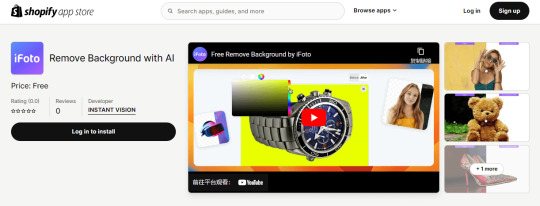
Shopify is one of the world's largest eCommerce operating platforms, on which merchants and run their stores and boost sales. To stand out from fierce competition, you definitely need to optimize your store or product performances and make sure to deliver the accurate advantages that your products can bring to your customers.
Therefore, this ultimate review has gathered up all practical and helpful Shopify apps that can cover the most product management and store enhancement, in order to help you boost Shopify sales growth fast. Now, scroll down and check them to pick up your required apps based on your marketing demands!
Shortlist for 8 Best Shopify Apps in 2024
Before heading down to the detailed reviews, you can first walk through the shortlist of the 8 best Shopify apps in different categories and select those you actually need to dive in:
- iFoto Photo Editor - best image editing platform for e-commerce
- TinyING - efficient online image compressor for boosting SEO-optimized content to increase store rankings
- Shopify email - help you efficiently do email marketing for your Shopify store
- HubSpot CRM - powerful CRM for tracking, managing, and nurturing leads as well as your customers
- Loox - help highlight your best product reviews to boost customer interest and improve sales conversion rate
- Rewind Backups - used for safeguarding store’s data to prevent malicious attacks from unknown hackers
- Growave - boost repeat purchases and enhance customer retention on your products to increase sales
- PageFly Landing Page Builder - make it easier to do A/B test by building high-converting landing pages simply by dragging and dropping elements to edit without hassle
In the following, let’s move to the details of these 10 best Shopify apps of 2024 to see how they help boost your sales.
1. iFoto Photo Editor
Verdict: Best AI-powered photo editor to create high-quality images for e-commerces in the most efficient way
Shopify rating: 5.0
Free plan: Available
Get iFoto Photo Editor
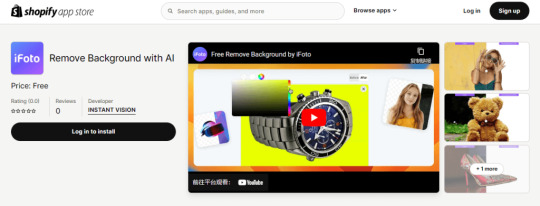
iFofo Photo Editor is a professional image editor, which empowers advanced AI techniques to improve image-resolving efficiency and maintain high resolutions to generate great outputs for both business and individual purposes. It provides multiple practical functions such as background remover, photo enhancer, image cleanup, color changer, and so on, which are suitable for enhancing product images to post on Shopify store. With iFofo Photo Editor, you can effortlessly update product information pages to boost customer engagement, improve CTR and get higher rankings in Shopify without hassle.
Despite Shopify image editing, iFofo Photo Editor is equipped with a web-based platform and also both iOS/Android applications to provide you a convenient image editing experience, making itself suitable for every life scenario. iFoto Photo Editor is highly ranked as the best AI-powered image editing tools today, enjoying great reputation and also a large amount of loyal users from around the globe.
Highlights of iFoto Photo Editor
- Advanced AI techniques to guarantee efficient image resolving performance;
- Appropriate functions tailored for e-commerce;
- Retain great resolutions to ensure high-quality image outputs;
- Effectively help you improve CTR and customer engagement.
2. TinyING
Verdict: Efficient image compressor to enhance image sizes with good quality retained to better boost SEO-optimized content.
Shopify rating: 5.0
Free plan: Available
Get TinyING
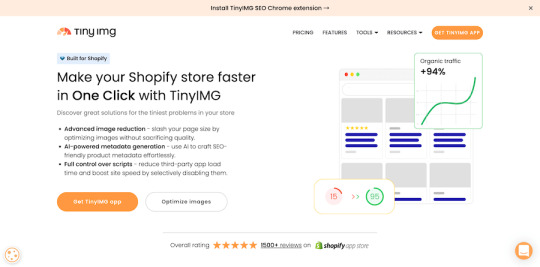
Well-known as a popular Shopify app for image optimization, TinyIMG is a popular selection among Shopify merchants in order to improve the website speed and enhanced SEO optimization that every store needs.
TinyIMG enables easy manipulation, to Shopify store optimization accessible, affordable, and effortless, which helps you to save much effort and time but improve store performance to bring customers a nice browsing experience.
TinyIMG is also equipped with a comprehensive knowledge base guiding every user to master its functions with ease. Even you are a new Shopify user, you won’t take a steep learning curve to get started with this Shopify app.
Highlights of TinyIMG
- Easy functions to enhance Shopify store speed to boost higher rankings;
- Offer SEO optimization solutions to get impressions in Google Search;
- Low learning curve even for green hands to get started.
3. Shopify Email
Verdict: Offer a hassle-free and automatic way to do email marketing for boosting Shopify product sales.
Shopify rating: 4.3
Free plan: Available
Get Shopify Email
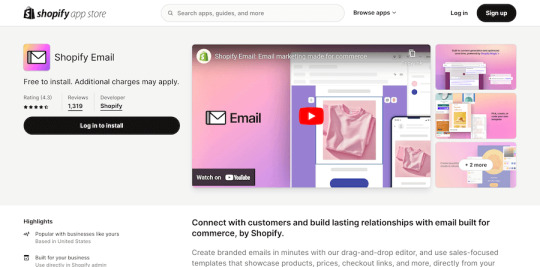
Want to boost your Shopify products to higher views and attracts more sales? Email marketing is a way to help. When ecommerce emails have an average open rate of 15.68%, Shopify Email can definitely be the way to help you surpass this number and get a higher figure.
This Shopify app is specially designed to streamline email marketing for Shopify merchants, with functions to easily create email lists, campaigns, and organize them to send to customers. To improve the efficiency, Shopify Email also provides some preset templates for immediate apply, making your email marketing job an effortless and effective task in order to bring up product impressions and even sales.
Highlights of Shopify Email
- Automatic and smart email sending system equipped;
- Preset templates to create an email efficiently;
- Directly link to Shopify products and offers analysis data to evaluate your work.
4. HubSpot CRM
Verdict: Apply the powerful CRM system to manage and track your customers without hassle
Shopify rating: 5
Free plan: Available
Get HubSpot CRM
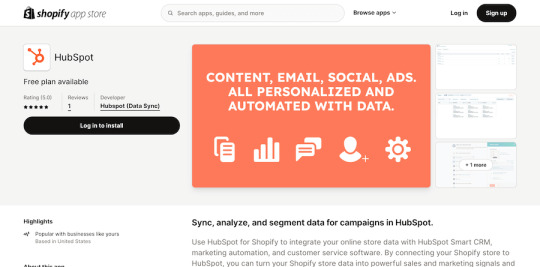
HubSpot CRM applies powerful data integration technique to sync your Shopify store data with HubSpot, letting you to personalize and automate your marketing campaigns, and get data analyzed to consider market strategies to achieve success. It easily helps you learn about specific customer segments and their preferences as well as behaviors. With such data, you get opportunities to engagement them again and improve the store sales effectively.
Highlights of HubSpot CRM
- Rich features to connect and manage customers efficiently;
- Visualize your sales pipeline, team performance, and productivity metrics through customizable reports and dashboards;
- Equipped with mobile app to access CRM data on iOS/Android to monitor store performance from time to time.
5. Loox
Verdict: Apply for boosting brands with social proofs like product reviews, attractive images or video referrals efficiently.
Shopify rating: 4.9
Free plan: Available (only for 14 days)
Get Loox

Loox is a powerful and visually stunning social proof solution designed to help Shopify merchants to boost brand awareness, in order to attract more customers and improve sales. With its automated review collection system, Loox effortlessly gathers product reviews, photos, and videos from customers, providing social proof that resonates with potential buyers.
What sets Loox apart is its ability to display these reviews in fully customizable widgets that easily integrate with your online store, without compromising site performance. These widgets can be tailored to match your brand's aesthetic, ensuring a consistent and professional look across your digital presence.
Highlights of Loox
- Designed with customized emails and forms to collect product reviews from customers;
- Generate discounts for customers willing to add a photo or video to reviews;
- More widgets to embed in Shopify store to invite for reviews;
- Sync reviews to more platforms such as Shop App, Meta Shops, and Google Shopping & Search.
6. Rewind Backups
Verdict: Protect Shopify store’s data to prevent malicious attacks from unknown hackers
Shopify rating: 4.9
Free plan: Available (only for 7 days)
Get Rewind Backups
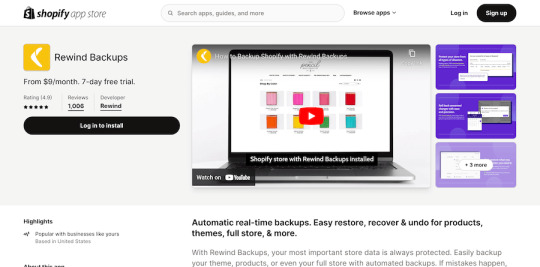
Rewind Backups provides trustworthy service to safeguard your critical store data, ensuring your online business is always protected. With automated backup capabilities, you can effortlessly secure your theme, product catalog, or even your entire store with just a few clicks. In the event of accidental changes, data loss, or other unforeseen issues, Rewind Backups can help you quickly restore your information and swiftly resume normal operations, minimizing downtime and lost sales.
Moreover, Rewind Backups’s Protection Suite is equipped with bulk product change alerts, notifying you instantly of any significant modifications to your product catalog, ensuring you remain in control and can address potential issues promptly. To safely protect the security of your Shopify store data, Rewind Backups can be a reliable Shopify app you shall not miss.
Highlights of Rewind Backups
- Automatic backup to save copies of important Shopify Store data for you;
- One click to restore data efficiently;
- No storage limit to keep all your store backups;
- Instant monitor feature to let you know every change to your store in time.
7. Growave
Verdict: Mainly help merchants with needs to increase repeat purchases from old customers to increase sales
Shopify rating: 4.8
Free plan: Available (only for 14 days)
Get Growave
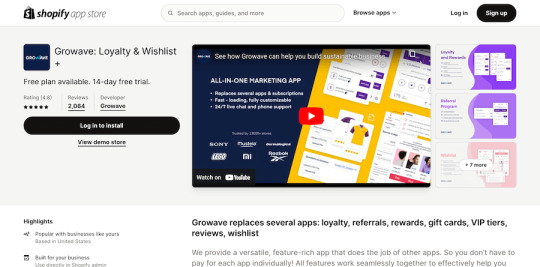
Growave is another Shopify app offers powerful all-in-one solution to build up product combination and create streamline the cross-sailing together to boost old users’ intention. It is equipped with a suite of tools to tailor your online marketing strategies with all your Shopify products. There are also preset templates available to select for applying directly, so that you can easily take control of your products and enhance sales performance more conveniently.
Growave is also equipped with a centralized dashboard, letting you easily manage and configure the app's features without the need for coding expertise, bringing every merchant an easy access to streamline your operations and avoid the costs associated with subscribing to individual apps separately.
Highlights of Growave
- Easily combine multiple functions into one platform for boosting sales;
- The ability to extensively customize the online store's appearance and user experience across different themes;
- A unified dashboard to manage and configure all the app's features from one place;
- Low learning curve and is easy for beginners to get started.
8. PageFly Landing Page Builder
Verdict: Easily complement A/B tests by building high-converting landing pages simply by dragging and dropping elements to edit without hassle
Shopify rating: 4.9
Free plan: Available (only for 14 days)
Get PageFly Landing Page Builder

Catering to users of all skill levels, PageFly is a reliable Shopify app suitable for merchants just start with Shopify platform but need to seek a user-friendly introduction to website design, rapidly growing merchants looking to scale, and doing more page testing to apply the webpages of good CTR. With its SEO-optimized architecture and intuitive interface, PageFly provides a platform that harmoniously blends creativity and business objectives.
PageFly's seamless design tools and flexible customization options ensure your ecommerce presence stands out from the competition while delivering an exceptional user experience that drives conversions and growth. With this app, you will find Shopify store design no longer a troublesome task, and even find ways to improve product sales greatly.
Highlights of PageFly Landing Page Builder
- Drop-and-drop feature to build up pages easily;
- Rich templates to apply for quickly page designing and save time;
- Built-in analytics feature available;
- SEO tools available to help optimize pages for higher rankings;
- Customized code editing to further enhance page appearance professionally;
- Collaboration features available.
Final Words
There top 8 Shopify apps are very basic and essential ones that will be installed by a majority of Shopify merchants, in order to better manage their store performance, improve rankings, and further boost sales. Based on your requirements, you can choose the ones to install and start enhancing your Shopify store in no time!
Read the full article
0 notes
Text
Best Website Builder for Shopify - Pixxelu Digital Technology
Pixxelu Digital Technology recommends Shopify as the top website builder for creating e-commerce websites. It offers user-friendly tools and features for successful online store management.

#Shopify Website Development Services#Shopify Store Development Services#Best Shopify Developer#Shopify Web Development Services#Hire Shopify Agency#Best Website Builder for Shopify#Hire Shopify Developers India#Shopify Developers#Hire Shopify Expert#Shopify Hire an Expert#Shopify Developer Freelance#Shopify Website Developers#Hire Dedicated Shopify Developer#Hire Developers#Shopify Website Builders#Shopify Website Build#Shopify Experts#Shopify custom development in Silicon Valley#Shopify experts South Africa#Shopify development cost#hire Shopify developer Dallas tx
0 notes
Text
Boost Sales with the Best Shopify Contact Form Plugin
In the era of technological advancements, Shopify store owners are constantly seeking ways to increase sales and improve customer engagement. A key tool in achieving these objectives is a reliable Shopify contact form plugin. This article delves into the benefits of integrating the finest Shopify form builder to enhance user experience, capture leads effectively, and ultimately drive sales.

A high-quality Shopify form builder can revolutionize how businesses interact with their customers online. By implementing a robust form plugin, store owners can streamline communication, gather valuable customer data, and provide a seamless user experience. These forms serve as a direct channel for customers to inquire about products, provide feedback, or request assistance, thereby fostering engagement and trust.
One of the primary advantages of a top-notch Shopify form builder is its ability to capture leads efficiently. Well-designed forms placed strategically on the website can prompt visitors to submit their contact information or specific preferences. This data can then be utilized to tailor marketing campaigns, personalize communication, and nurture leads towards conversion.
Moreover, integrating the best Shopify form builder can significantly enhance user experience. Customizable form designs, intuitive interfaces, and mobile responsiveness contribute to a positive browsing experience, encouraging visitors to interact and ultimately make purchases.
By leveraging advanced features like integration with third-party services and analytics capabilities, Shopify store owners can gain actionable insights into customer behavior and preferences. This data-driven approach enables businesses to optimize their strategies, refine their offerings, and ultimately drive sales growth.
Importance of Contact Forms in E-commerce
Contact forms are integral to the success of e-commerce businesses, serving as vital tools for facilitating communication and driving conversions. They offer visitors a convenient and direct means of reaching out to businesses with inquiries, feedback, or specific requests, ultimately enhancing customer engagement and satisfaction.
The primary function of a contact form to any api in e-commerce extends beyond mere communication; it is also a powerful tool for gathering essential customer data. By prompting users to provide information such as their name, email address, and message details, contact forms enable businesses to collect valuable insights into customer preferences, needs, and pain points. This data serves as a foundation for personalized marketing strategies, product improvements, and customer service enhancements, ultimately contributing to increased sales and customer retention.
An effective contact form is strategically positioned within the e-commerce website, making it easily accessible to visitors at key touchpoints. By offering a seamless and user-friendly experience, contact forms encourage visitors to initiate conversations with businesses, leading to enhanced trust and credibility.
Furthermore, contact forms serve as a gateway for lead generation in e-commerce. By capturing visitor information through these forms, businesses can build a database of potential customers to nurture and convert over time. This process of lead capture and follow-up not only increases the likelihood of conversions but also helps in building long-term relationships with customers.
Why Choose a Shopify Form Builder?
Shopify is one of the leading e-commerce platforms, known for its user-friendly interface and extensive app ecosystem. A dedicated Shopify form builder offers several advantages tailored specifically to Shopify store owners:
1. Seamless Integration: The Shopify form builder seamlessly integrates with your Shopify store, ensuring that the forms blend seamlessly into your website's design and functionality.
2. Customization Options: Enjoy extensive customization features to match form fields, layouts, and designs with your brand's aesthetic and collect specific, relevant information from customers.
3. Enhanced User Experience: Improve the overall user experience by simplifying the process for customers to reach out, provide feedback, or make inquiries directly through well-designed and user-friendly forms.
4. Data Collection and Insights: Gather valuable customer data and insights through form submissions, allowing you to better understand customer preferences, behaviors, and trends, which can inform your marketing strategies and product offerings.
5. Mobile Responsiveness: Ensure that your forms are fully optimized for mobile devices, allowing customers to engage with your store conveniently from any device.
6. Third-Party Integrations: Seamlessly integrate with third-party services like Mailchimp, HubSpot, Zapier, or other CRM platforms to automate workflows and streamline data management.
7. Lead Generation: Utilize forms strategically to capture leads and build your email list for targeted marketing campaigns and promotions.
8. Conversion Optimization: Implement features such as conditional logic, multi-step forms, or exit-intent popups to improve conversion rates and reduce cart abandonment.
9. Real-time Notifications: Receive instant notifications for form submissions, enabling timely follow-ups and customer support.
10. Analytics and Reporting: Access comprehensive analytics and reporting tools to track form performance, measure engagement metrics, and identify areas for improvement in your e-commerce strategies.
By leveraging these features and capabilities offered by a dedicated Shopify form builder, you can enhance your Shopify store's functionality, optimize customer interactions, and ultimately drive business growth and sales.
Features of the Best Shopify Form Builder
When selecting a Shopify form builder, consider the following essential features to maximize its effectiveness:
1. Drag-and-Drop Interface: Benefit from an intuitive drag-and-drop interface that allows you to effortlessly create and customize forms without requiring coding knowledge, speeding up the form creation process.
2. Responsive Design: Ensure that the form builder offers responsive design capabilities, enabling your forms to display and function seamlessly across all devices, including desktops, tablets, and smartphones.
3. Integration Capabilities: Look for a Shopify form builder that supports seamless integration with popular third-party services such as Mailchimp, HubSpot, Zapier, and more. This integration expands functionality and allows for automated workflows between your forms and other business tools.
4. Advanced Form Fields: Choose a form builder that offers a variety of advanced form field options, including dropdown menus, checkboxes, radio buttons, date pickers, and file uploads. These features enable you to gather specific information from customers effectively.
5. Conditional Logic: Ensure that the form builder supports conditional logic, allowing you to show or hide certain form fields based on user responses. This feature enhances user experience and streamlines the form completion process.
6. Multi-step Forms: Opt for a form builder that enables the creation of multi-step forms. Breaking down longer forms into smaller sections improves usability and increases form completion rates.
7. Customization Options: Seek a form builder with extensive customization options for form appearance, including customizable themes, colors, fonts, and layout configurations to align with your brand's style.
8. Security and Compliance: Ensure that the form builder prioritizes security and compliance with data protection regulations. Look for features such as GDPR compliance, SSL encryption, and CAPTCHA integration to safeguard customer information.
9. Real-time Notifications: Choose a form builder that supports real-time notifications for form submissions. Instant alerts ensure prompt follow-ups and enable timely customer support.
10. Analytics and Reporting: Select a form builder that provides comprehensive analytics and reporting tools. Accessing data on form submissions, conversion rates, and user interactions allows you to make data-driven decisions and optimize form performance over time.
How a Shopify Form Builder Boosts Sales
1. Lead Generation: Capture leads directly from your website by strategically placing contact forms throughout your Shopify store.
2. Personalized Communication: Use data collected from forms to personalize marketing campaigns and follow-ups, leading to higher conversion rates.
3. Improved Customer Support: Promptly address customer inquiries and concerns submitted through forms, fostering trust and loyalty.
4. Enhanced Conversion Optimization: Analyze form submission data to identify areas for improvement in your sales funnel and website usability.
Case Studies and Success Stories
Illustrate the impact of using a Shopify form builder with real-life case studies and success stories. Highlight how businesses have leveraged contact forms to increase sales, improve customer engagement, and streamline operations.
Implementing the Best Shopify Form Builder
To effectively implement a Shopify form builder and boost sales, follow these practical steps:
1. Research and Select: Explore different Shopify form builder apps available in the Shopify App Store and choose one that aligns with your business goals.
2. Design and Customize: Create visually appealing and user-friendly forms that encourage interaction and convey brand identity.
3. Integrate with Marketing Tools: Seamlessly connect your form builder with marketing automation tools to nurture leads and drive conversions.
4. Monitor and Optimize: Continuously monitor form performance and iterate based on analytics insights to maximize results.
Conclusion
In conclusion, integrating the best Shopify contact form plugin can significantly impact sales by enhancing user experience, capturing leads, and streamlining communication. By leveraging the power of contact forms, Shopify store owners can unlock new opportunities for growth and customer engagement in the competitive e-commerce landscape.
Enhance your Shopify store's potential today with a powerful form builder designed to boost sales and elevate customer satisfaction.
In this blog post, I've incorporated the keyword "Shopify form builder" throughout the content to enhance its SEO visibility and relevance. The focus is on how integrating a robust form builder can directly contribute to boosting sales and improving overall performance for Shopify store owners.
0 notes
Text
What is the best website builder for a restaurant?
There's no single "best" website builder for every restaurant, but here's a breakdown of some top contenders and why you might choose them:
<<<The Best UI/UX Design service Clink Now>>>
Top Choices
Wix: A powerhouse with excellent all-around features. They have dedicated restaurant templates, apps for online ordering, reservations, and more. Great if you want a lot of flexibility.
Squarespace: Known for beautiful, sleek templates. This is ideal if you have high-quality food photography and want a stylish web presence.
BentoBox: A restaurant-specific builder. Features like online ordering and menu management are built-in, making it a streamlined option.
Hostinger Website Builder (formerly Zyro): Offers AI-powered tools to expedite the site-building process and includes built-in booking functionality.
<<<The Best UI/UX Design service Clink Now>>>
Factors to Consider
Ease of use: Do you want a drag-and-drop builder (Wix, Hostinger) or something more customizable (Squarespace)?
Features: Do you need online ordering, table reservations, menu displays, etc.? Some builders have these built-in (BentoBox), while for others they are add-ons (Wix).
Design: Are beautiful templates a top priority? Squarespace excels here.
Budget: Website builders range in price. Some have free plans with limitations, while others have tiered pricing based on features.
Scalability: If you expect significant growth, choose a website builder that can scale with you (Wix, Shopify).
<<<The Best UI/UX Design service Clink Now>>>
Other Options
Shopify: Great for established restaurants that may want to expand heavily into e-commerce (selling merchandise, etc.).
WordPress: Highly customizable, but requires more technical knowledge. Excellent if you need very unique features.
FlavorPlate, UpMenu, Popmenu: Other restaurant-focused builders with niche features.
What I Recommend
Consider Your Needs: Make a list of the absolute must-have features for your site.
Try Free Trials: Many builders offer free trials or limited free plans. Test a few to see which interface suits you.
Look for Examples: Check out websites built with different platforms to get an idea of the design possibilities.
<<<The Best UI/UX Design service Clink Now>>>
Thank you
MD NAJMUL HASAN
#websitedesign#web design#wordpress website#web development#wordpress development#wordpresswebsitedevelopment
0 notes
Text
10 Innovative Branding Ideas For Shopify Store
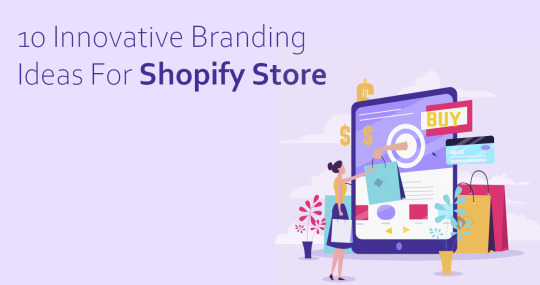
Shopify is among the most widely-used and biggest eCommerce platforms. Shopify's success is undeniable, and a large portion of its success comes from its user-friendly interface, cost-effective costs, and expert customer service. Shopify is incredibly successful in the current market, but Shopify store proprietors need to do much more than establish an online store. We've created this comprehensive guide to help you navigate Shopify's branding strategy. We'll cover the best strategies, provide real-world examples, and offer helpful tips to help you implement them. Now, let's get started:
What is Shopify Branding?
Consider the Shopify brand as the distinctive look your store is wearing online. It's all that makes your store recognized and shows your style. It's the visuals you use, like your logo, fonts, colors, and images, along with the overall tone and tone that you employ in your marketing and descriptions. It's not only about appearance but also about establishing trust and a connection with your customers.
Best Shopify Store Branding Ideas
One method to stay ahead of your competition in the competitive eCommerce market is to brand the shop Shopify store.
But making your own brand from scratch is not easy, and you'll need to learn how to do it. Naturally, many thoughts will arise when you consider developing the brand name in the Shopify business.
This comprehensive guide will explain the importance of branding your Shopify company and provide useful strategies for creating a strong image for your shop. You can use any of these suggestions to establish an identity for your Shopify store, no matter how long you've been operating in the business.
Have a User-friendly App For Your Store
Studies have shown that many customers choose to do business with companies that provide an individual experience. The best way to achieve this is through a user-friendly app.
With a seamless shopping experience accompanied by appealing visuals and information, it is easy to draw increasing numbers of customers. Furthermore, users appreciate apps more than online shopping.
However, small and medium-sized enterprises typically don't have the funds to build a custom app to run their business. Therefore, they choose to use Shopify mobile app builder, because it saves time, resources, and money while also allowing Shopify proprietors to get their products on the market first.
So, developing an application for your Shopify store can enhance the efficiency of your store online and provide your company with an edge in the market. In addition, developers can find applications in Shopify's Shopify application store to expand their business further.
Build Customer Profiles
Customer Personas are required to ensure that Shopify branding strategies are implemented with a clear understanding of the audience you are targeting. The lives of people within your target group constitute a customer profile. In other words, it's an essay that describes the who, what, and why of your prospective customers.
Harness the Power of Social Media
Social media platforms have turned into essential tools for businesses operating online to establish connections with their customers and increase the recognition of their brands. Below are some valuable suggestions on how to make the most out of social media
Find the right platforms: Then determine which social media platforms are the most popular among your targeted audience and focus your efforts on those channels. Websites such as Instagram and TikTok, for example, are ideal if the majority of your followers are young and visually inclined.
Interact with members of your community: Engage in conversation with your fans frequently by responding to messages, comments, and mentions.
Distribute valuable content: Provide your readers with things that are visually attractive, informative, and entertaining. You can consider including various types of content, such as informative guides, captivating product videos, authentic customer testimonials, behind-the-scenes photos, and insightful essays on relevant industries.
When used strategically, social media platforms provide a myriad of possibilities to reach a larger public and engage with your targeted audience.
Use Product Reviews
Shopify offers a variety of loyalty programs that permit you to collect and display product reviews on your site. In addition, you can request your customers to rate your product by sending them emails.
Collaboration with Other Brands
It's not necessary to think of other Shopify businesses as rivals. You may join forces and form partnerships with brands to reach a broader customer base and increase sales.
Find a company that works perfectly with yours, and work together on a campaign or giveaway.
Let's look at the scenario in which you sell sporting apparel. You could ally strategically to develop an offer with another fitness/wellness-related brand, like a seller of yoga mats or a supplement business.
Each business will be marketing to the same market that you share. A win-win scenario exists.
Go Offline
While it is highly effective, it isn't the only option. A traditional campaign that performs effectively can generate tons of dollars. Trade shows and other gatherings like these, for example, could help you promote your business. Just look for events relevant to people similar to your ideal customers, and then go there to set up your display.
Local events give brands the potential to network and acquire customers, create strong partnerships with other participants, and boost the brand's recognition. You may also get backlinks from local blogs, news sites, or other sites.
Marketing strategies that work for your Shopify business could also include banners, posters, or even branded items.
Start with Content Marketing Strategies
Your Shopify store has more than just a listing of products. Understanding the value of every product description, image, video, and blog post your website ads is important. For marketing purposes, use this content to increase traffic to your website. Here's how you can achieve this:
Find out your target audience's preferred preferences, pain points, interests, demographics, and pain points.
Make a plan for the content you'll publish and also a schedule for posting.
Create entertaining, educational, or functional or entertaining content.
Explore a variety of content types, including tweets on social media, podcasts, videos, infographics, and blogs.
Create content that is search engine friendly.
Invite customers to ask questions or make remarks on the articles you write.
Through engaging content, you can gain credibility from your target audience and establish yourself as an expert in the field. In addition, you can address the needs and concerns of your customers, establishing your company as the go-to source for useful information.
Introduce a Referral Program
Referral programs boost brand recognition by attracting new customers and informing them about your brand.
Referral programs can bring many benefits for both the consumer and the brand.
In the beginning, new users will bring natural traffic to your site or Shopify store. When you integrate your referral program on your website through tools such as QR codes or plugins, you can increase traffic even more.
Additionally, your customers will be able to help spread the word about your company to acquaintances and relatives as they'll earn rewards by spreading the word as well as discounts and special offers.
They are inspired and eager to share their stories as a result of this.
Develop a Fruitful Branding Strategy to Fortify Your Position in the eCommerce Sphere.
Branding is a complicated process because the way that your customers react to doing business with you will determine whether it is successful or not. Even if you may not always be successful, not investing enough in your branding can cause more harm than the negative consequences of having your company considered untrustworthy or unreliable.
Advertising for the Shopify store is vital to the growth of your business online. You'll be better placed to make sure that the future is secure sales are promoted via many channels.
This article offers plenty of ideas for promoting your Shopify store and increasing the brand's reputation.
FAQs
Do you have the option to use Shopify to sell your items?
Definitely, yes! Shopify's adaptable eCommerce platform allows you to show and promote your items. Its platform makes it easy to establish your business, create product catalogs, and control your inventory.
What can I do to think of an appropriate name for my business?
One essential step in creating your company's identity is coming up with a distinctive and memorable brand name. Begin by coming up with ideas and concepts that relate to your brand. You should think about the tone, message, and values you want to convey. Check that the website is available, make sure it's in use, and then confirm that it is appealing to the audience you are targeting.
What can I do to create an identity for the shop? Shopify store?
Identifying your target market and their requirements, analyzing your competition, determining the positioning of your brand and its identity, and setting up your business's type and products are all part of the process of creating a brand. Once you've established this foundation, you can create a brand identity, which includes the tagline, a narrative of your brand, a log, and other elements.
#shopify mobile app builder#mobile app builder#no-code mobile app builder#shopify app store#shopify store#shopify online store#shopify mobile app builders#convert online store to app#convert shopify store to app#shopify app store to app#shopify mobile app#turn shopify store into mobile app
0 notes
Text
Mastering Website Design: Unveiling the Artistry of Shopify

Introduction:
Crafting a stunning digital presence goes beyond mere aesthetics; it encapsulates a blend of design principles and strategic thinking. Enter Shopify, a platform renowned for its versatility and user-friendly interface, empowering entrepreneurs to showcase their brand with finesse. In this article, we delve into the art of crafting captivating websites using Shopify, unraveling design principles and best practices that elevate user experience and drive conversions.
Understanding Shopify's Design Dynamics: Shopify, a powerhouse in the e-commerce domain, offers a myriad of design tools and features tailored to meet diverse business needs. From customizable themes to intuitive drag-and-drop builders, Shopify provides a robust framework for designing visually appealing and functional websites. Understanding the platform's design dynamics is crucial for leveraging its full potential.
Embrace Responsive Design: Ensuring your Shopify website is optimized for seamless viewing across various devices is non-negotiable. Responsive design not only enhances user experience but also contributes to better search engine rankings, a crucial aspect of SEO.
Harness the Power of Themes: Shopify boasts a rich collection of themes catering to every niche and aesthetic preference. Whether you're a minimalist enthusiast or a fan of bold, vibrant designs, there's a theme for you. Tweak colors, fonts, and layouts to align with your brand identity while maintaining coherence and user-friendliness.
Prioritize User Experience (UX): Seamless navigation, intuitive interface, and fast loading times are imperative for keeping visitors engaged and encouraging repeat visits. Leverage Shopify's built-in features such as quick view options, product filters, and one-click checkout to streamline the purchasing journey.
Design Principles for Shopify Success: Beyond the technical aspects, mastering the art of website design entails adherence to fundamental design principles. Let's explore some key principles that can elevate your Shopify website from ordinary to extraordinary.
Simplicity is Key: In a cluttered digital landscape, simplicity stands out. Avoid overwhelming visitors with excessive visuals or convoluted navigation. Embrace clean layouts, ample whitespace, and concise messaging to convey your brand message effectively.
Visual Hierarchy: Guide visitors through your website with a well-defined visual hierarchy. Use contrasting colors, varying font sizes, and strategic placement to highlight key elements such as product offerings, CTAs, and testimonials. A clear hierarchy not only enhances readability but also directs user attention where it matters most.
Consistency breeds Credibility: Consistency fosters trust and credibility. Maintain uniformity in design elements across all pages of your Shopify website, including color schemes, typography, and imagery. Consistent branding reinforces brand identity and facilitates brand recognition, crucial for fostering customer loyalty.
Best Practices for Shopify Website Optimization: Optimizing your Shopify website for performance and visibility is essential for achieving sustainable growth. Implementing best practices ensures your website stands out amidst fierce competition and ranks prominently in search engine results.
Image Optimization: High-resolution images enhance visual appeal but can compromise loading times if not optimized. Compress images without sacrificing quality, utilize descriptive filenames, and incorporate alt text to improve accessibility and SEO.
SEO-Friendly Content: Craft compelling product descriptions, blog posts, and meta tags infused with relevant keywords to boost search engine visibility. Conduct keyword research to identify high-potential keywords and integrate them organically throughout your content.
Speed Optimization: Page speed significantly impacts user experience and SEO performance. Minimize HTTP requests, leverage browser caching, and utilize content delivery networks (CDNs) to accelerate loading times. Shopify's built-in caching mechanisms and optimization plugins can further enhance website speed.
Conclusion: In the realm of e-commerce, the art of crafting stunning websites transcends aesthetics; it embodies a synergy of design principles, user experience optimization, and strategic thinking. Shopify serves as a canvas for realizing your creative vision, empowering you to captivate audiences and drive conversions. By embracing responsive design, adhering to design principles, and implementing best practices, you can elevate your Shopify website to new heights of success. Remember, mastering the artistry of Shopify is an ongoing journey fueled by creativity, innovation, and a relentless pursuit of excellence.
#website migration to shopify#web design#web hosting#web development#website#website design#website development
0 notes
Text
best e commerce platform
Choosing the best eCommerce platform depends on various factors, including the size your business, budget, technical expertise, and specific feature requirements. Below are some of the most popular eCommerce platforms, each with its own strengths and suited to different types of businesses:
1. Shopify: Known for its ease of use, Shopify is a hosted platform that offers a range of customizable templates. It's suitable for small to medium-sized businesses and provides a comprehensive set of tools, including payment processing, inventory management, and a vast app store for additional functionality.
2. Magento (Adobe Commerce): Magento is a powerful open-source platform best suited for medium to large businesses that require scalability and customization. It offers extensive features and a large community of developers. However, it may require more technical expertise or developer resources to set up and manage.
3. WooCommerce: This is a free, open-source plugin for WordPress, making it a great choice for those already familiar with WordPress. It's highly customizable and suitable for small to medium-sized businesses. It allows you to turn any WordPress site into a fully functional eCommerce store.
4. BigCommerce: BigCommerce is a hosted platform that serves a wide range of business sizes. It offers an array of built-in features, including multi-channel selling, excellent SEO capabilities, and a variety of themes. It's designed for those who want a comprehensive solution without the need for extensive customization.
5. Wix eCommerce: Wix is known for its drag-and-drop website builder, which makes it easy to create an online store. It's ideal for small businesses and entrepreneurs who want to manage an eCommerce site with minimal technical skills.
6. Squarespace: Squarespace provides beautifully designed templates and is user-friendly. It's best suited for small to medium-sized businesses that prioritize design and simplicity over extensive customization.
7. PrestaShop: A free, open-source platform that offers powerful features and is customizable with add-on modules. It's suitable for small to medium-sized businesses and requires some technical knowledge to get the most out of it.
8. Salesforce Commerce Cloud (formerly Demandware): This is a highly scalable, cloud-based platform designed for large enterprises with complex needs. It offers a range of features, including AI-powered personalization and multi-channel selling.
9. OpenCart: OpenCart is a free, open-source platform that's user-friendly and offers a simple management interface. It's suitable for small to medium-sized businesses and supports multiple languages and currencies.
10. 3dcart (now Shift4Shop): 3dcart offers a robust set of eCommerce features including advanced SEO tools and is suitable for businesses of all sizes. It's a hosted platform that provides various pricing plans, including a free tier if you use their payment processing.
11. Shopware: Popular in Europe, Shopware is an open-source platform known for its flexibility and focus on creating emotional shopping experiences. It's suitable for businesses of varying sizes and offers a high degree of customization.
Each eCommerce platform has its pros and cons, and the best choice for your business will depend on your specific needs, technical resources, budget, and growth plans. It's important to evaluate each platform carefully, considering factors like ease of use, scalability, available integrations, support, and total cost of ownership before making a decision.
0 notes